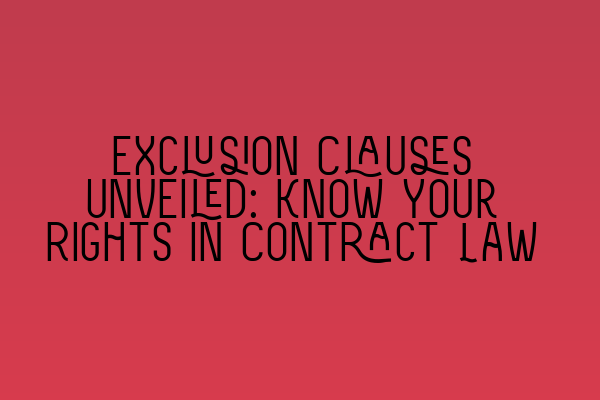Exclusion Clauses Unveiled: Know Your Rights in Contract Law
In the complex world of contract law, there are various clauses that are often included to protect the parties involved in a contract. One such clause is the exclusion clause, which aims to limit or exclude liability for certain events or damages. While exclusion clauses can be beneficial for businesses and individuals alike, it is crucial to fully understand your rights and responsibilities when dealing with them.
In this blog post, we will delve deeper into the realm of exclusion clauses, exploring their purpose, types, and legal implications. Whether you are a solicitor, a business owner, or simply interested in the intricacies of contract law, this article will provide you with valuable insights. So, let’s dive in!
**What is an Exclusion Clause?**
An exclusion clause is a provision within a contract that seeks to restrict or eliminate liability for specific events, losses, or damages that may arise as a result of the contract. It serves as a protective measure for parties engaging in various agreements, such as purchase contracts, rental agreements, or services contracts.
For example, a contract between a landlord and a tenant may include an exclusion clause stating that the landlord will not be held responsible for any damages caused by natural disasters. Similarly, a service provider may include an exclusion clause to limit their liability for any losses incurred by their clients during the provision of the service.
**Types of Exclusion Clauses**
Exclusion clauses can take different forms, each serving a specific purpose. Here are the most common types of exclusion clauses:
1. Exclusion of Liability: This type of clause aims to eliminate liability for specific events or damages that may occur as part of the contract. It essentially frees the party in question from any responsibility or obligation in relation to the specified events.
2. Limitation of Liability: Unlike an exclusion of liability clause, a limitation of liability clause seeks to restrict the amount of damages that one party may be held liable for in case of a breach, negligence, or other specified circumstances. This clause sets a cap on the potential financial repercussions for the party at fault.
3. Indemnity Clause: An indemnity clause is designed to shift the financial burden from one party to another in the event of losses or damages. It establishes an obligation for one party to reimburse the other for any losses incurred as a result of specified events.
**Understanding Your Rights**
While exclusion clauses can be beneficial in certain situations, it is essential to understand your rights and obligations as a party to a contract. Here are some key points to consider:
1. Contractual Freedom: The law generally supports the freedom to negotiate and agree on contract terms, including exclusion clauses. However, there are legal limits to this freedom, particularly when it comes to fairness and reasonableness.
2. Unfair Contract Terms Act 1977: In the United Kingdom, the Unfair Contract Terms Act helps safeguard individuals and consumers from unfair exclusion clauses that may be unreasonable or oppressive. The law provides criteria for assessing whether a clause is fair and reasonable, considering factors such as bargaining power, awareness of the clause, and the nature of the agreement.
3. Incorporation and Construction: For an exclusion clause to be enforceable, it must be adequately incorporated into the contract and construed in a manner that gives effect to the parties’ intentions. This requires careful drafting, clear language, and proper placement within the contract.
**Seeking Legal Advice**
Given the complexity and potential legal implications of exclusion clauses, it is advisable to seek legal advice before entering into any agreement. A solicitor specializing in contract law can provide valuable guidance, ensuring that your rights are protected and that the terms of the contract are fair and reasonable.
At SQE Contract Law, we offer comprehensive legal services and expert advice on all aspects of contract law. Our solicitors are highly experienced in handling exclusion clauses and can assist you in deciphering the intricacies of your contracts. Whether you are an individual seeking advice on a personal contract or a business owner dealing with commercial agreements, our team is here to help.
For more information on contract law and related topics, you may find the following articles helpful:
– [SQE 1 Practice Exam Questions](https://fqps.co.uk/sqe/sqe1-preparation/mcq-practice-quiz)
– [SQE 1 Practice Mocks FLK1 FLK2](https://fqps.co.uk/sqe/sqe1-preparation/practice-mocks-quiz)
– [SQE 2 Preparation Courses](https://fqps.co.uk/sqe/sqe2-preparation)
– [SQE 1 Preparation Courses](https://fqps.co.uk/sqe/sqe1-preparation)
– [SRA SQE Exam Dates](https://fqps.co.uk/sqe/sqe1-sqe2-exam-dates)
In conclusion, exclusion clauses play a vital role in contract law, allowing parties to limit or exclude liability for specific events or damages. Understanding your rights and seeking professional legal advice is crucial to ensure fair and reasonable contract terms. By staying informed and informed, you can navigate the intricate world of exclusion clauses with confidence and protect your interests effectively.
